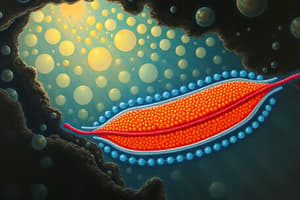Podcast
Questions and Answers
What drives the budding process of vesicles?
What drives the budding process of vesicles?
- Fusion with the target membrane
- Energy released from ATP hydrolysis
- Assembly of a protein coat (correct)
- Active transport mechanisms
Which GTPase is responsible for COPII coat assembly at the ER membrane?
Which GTPase is responsible for COPII coat assembly at the ER membrane?
- ARF
- Rab
- Rho
- Sar1 (correct)
What is the primary role of cargo within vesicles?
What is the primary role of cargo within vesicles?
- To facilitate membrane fusion
- To be transported from donor to target compartments (correct)
- To provide structural support for vesicle integrity
- To promote ATP synthesis
What is the function of Sar1-GEF in the vesicle transport process?
What is the function of Sar1-GEF in the vesicle transport process?
Which pathway involves retrieving vesicles back to the ER?
Which pathway involves retrieving vesicles back to the ER?
What does COP stand for in the context of vesicle transport?
What does COP stand for in the context of vesicle transport?
Which of the following is NOT a component found in the vesicles?
Which of the following is NOT a component found in the vesicles?
What type of process is involved in the targeting of vesicles to their respective compartments?
What type of process is involved in the targeting of vesicles to their respective compartments?
What role do specific Rab proteins play in the targeting process of vesicles?
What role do specific Rab proteins play in the targeting process of vesicles?
What is the primary function of SNARE proteins in vesicular transport?
What is the primary function of SNARE proteins in vesicular transport?
How close must membranes be to allow for fusion during vesicular transport?
How close must membranes be to allow for fusion during vesicular transport?
Which of the following pairs of proteins is unique to each transport vesicle-target membrane interaction?
Which of the following pairs of proteins is unique to each transport vesicle-target membrane interaction?
What happens to the cargo once a vesicle fuses with the target membrane?
What happens to the cargo once a vesicle fuses with the target membrane?
What is the primary function of COPII adaptor proteins in vesicle formation?
What is the primary function of COPII adaptor proteins in vesicle formation?
Which step follows the recruitment of COPII adaptor proteins in COPII vesicle formation?
Which step follows the recruitment of COPII adaptor proteins in COPII vesicle formation?
What is an essential characteristic of membrane-bound proteins with exit signals?
What is an essential characteristic of membrane-bound proteins with exit signals?
What dual role does the coat of a vesicle serve during cargo transport?
What dual role does the coat of a vesicle serve during cargo transport?
Which of the following is typically true about exit signals found on cargo proteins?
Which of the following is typically true about exit signals found on cargo proteins?
What consequence can occur when resident ER proteins are encapsulated within vesicles?
What consequence can occur when resident ER proteins are encapsulated within vesicles?
How do vesicles ensure they reach the correct target compartment?
How do vesicles ensure they reach the correct target compartment?
What is one reason resident ER proteins might end up in vesicles despite not having exit signals?
What is one reason resident ER proteins might end up in vesicles despite not having exit signals?
Which mechanism does NOT participate in the trafficking of proteins to cellular compartments?
Which mechanism does NOT participate in the trafficking of proteins to cellular compartments?
What is the role of vesicles in the endomembrane system?
What is the role of vesicles in the endomembrane system?
Which of the following correctly describes the relationship between membrane topology in the ER and the plasma membrane?
Which of the following correctly describes the relationship between membrane topology in the ER and the plasma membrane?
What type of proteins do vesicles transport?
What type of proteins do vesicles transport?
What characterizes the endomembrane system?
What characterizes the endomembrane system?
How are proteins typically delivered to membrane-enclosed organelles?
How are proteins typically delivered to membrane-enclosed organelles?
In terms of membrane topology, where does the part of a protein that is inside the ER end up?
In terms of membrane topology, where does the part of a protein that is inside the ER end up?
Which statement is true regarding the communication between membranes in the endomembrane system?
Which statement is true regarding the communication between membranes in the endomembrane system?
Study Notes
Vesicular Transport and the Endomembrane System
- Proteins are synthesized in the cytosol and trafficked to specific cellular compartments.
- Three mechanisms transport proteins to their destinations:
- Fully-folded proteins moving through pores.
- Unfolded polypeptide chains moving through protein translocators.
- Delivery by transport vesicles.
- The endomembrane system includes the extracellular space and all membrane-enclosed compartments.
- Vesicles facilitate communication between these compartments.
- Vesicle transport involves the movement of soluble proteins, membrane proteins, and lipids.
Membrane Topology
- The leaflet facing the lumen of the ER or Golgi is the leaflet facing the outside of the cell.
- The leaflet facing the cytoplasm of the ER or Golgi faces the cytoplasm of the plasma membrane.
- Proteins within the lumen of the ER or Golgi are also on the outside of the cell.
- Proteins facing the cytoplasm in the ER or Golgi also face the cytoplasm in the plasma membrane.
Vesicle Transport: Sorting
- Vesicles must be sorted to ensure they reach the correct targets.
- Each organelle maintains its own identity and protein/lipid compositions.
Vesicle Transport: The Basics
- Vesicles bud from a donor compartment and fuse with a target compartment.
- Cargo includes soluble proteins, membrane proteins, and lipids.
Vesicle Budding: Protein Coats
- Vesicle budding is driven by the assembly of a protein coat.
- Different types of coats are used for specific steps in vesicle transport.
- COPII coats are responsible for ER to Golgi vesicle traffic.
COPII-Coated Vesicle Formation
- The monomeric GTPase Sar1 is responsible for COPII coat assembly.
- Sar1’s activity is spatially regulated by an ER-associated Sar1-GEF.
- Sar1-GTP recruits COPII adaptor proteins, which:
- Select cargo proteins for packaging.
- Initiate ER membrane deformation.
- Recruit outer coat proteins to form a bud.
Cargo Selection
- Cargo proteins are selected based on exit signals, which are often specific amino acid sequences.
- Both soluble and membrane-bound proteins have exit signals.
- Membrane-bound proteins with exit signals can either:
- Reside in the membrane of another organelle.
- Act as cargo receptors for soluble proteins and be recycled back to the ER.
Coat Function
- The inner coat concentrates cargo.
- The outer coat, with its curved structure, deforms the membrane and shapes the vesicle.
Vesicle Targeting
- Vesicle targeting involves a sequential system to ensure accuracy.
- First, Rab proteins on the vesicle surface are recognized by tethering proteins on the target membrane.
- Second, v-SNAREs on the vesicle interact with complementary t-SNAREs on the target membrane.
- Unique Rab-tether and v-SNARE-t-SNARE pairs are specific to each vesicle-target membrane pair.
Vesicle Fusion with Target
- SNARE proteins help dock the vesicle to and fuse it with the target membrane.
- SNAREs catalyze the fusion process.
- Lipid flow from one bilayer to another requires the membranes to be within 1.5 nm of each other.
Cargo Release
- Upon fusion, the cargo receptor releases soluble cargo.
Upcoming Topics
- ER exit and quality control.
- The Golgi apparatus.
- Exocytosis.
Studying That Suits You
Use AI to generate personalized quizzes and flashcards to suit your learning preferences.
Related Documents
Description
Explore the intricate processes of vesicular transport and membrane topology within the endomembrane system. This quiz covers protein synthesis, transportation mechanisms, and the orientation of proteins in the endoplasmic reticulum and Golgi apparatus. Test your knowledge of cellular compartments and their functions!





